
Enemies Of Peace: Ulfa (I) Continues Its Nefarious Activities
What will it take to to get the Paresh Barua faction of Ulfa to talk peace? Or, is that too optimistic an idea?
Sidelined by the ongoing peace process between the government and the United Liberation Front of Assam (Ulfa), the other faction led by hardliner Paresh Baruah, the Ulfa (Independent), today gets media attention primarily for their misdeeds like extortion and threatening.
The recent kidnapping of an Assamese youth from Changlang locality of Arunachal Pradesh and later his rescue by the police from a Myanmar-bordering village indicates that the banned outfit continues its disruptive activities. Kuldeep Moran, 27, son of a Panchayat member based in Kakopathar locality of Tinsukia, was abducted by Ulfa (I)
militants on 1 August and freed on 9 September.
The militant outfit sent a video clipping to the local media houses on 22 August claiming that it had abducted Moran for a ransom of rupees one crore. The Guwahati-based news channels beamed the footage showing Moran with five masked cadres armed with sophisticated weapons, a style now adopted by the Islamist terror outfits.
In the video footage, Moran was seen kneeling down and appealing to his father, a Bharatiya Janata Party leader, along with Sadiya’s legislator Bolin Chetia and Assam Chief Minister Sarbananda Sonowal to get him released by paying the ransom. Moran, who is married, also described his hardships under the custody of the Ulfa (I) rebels.
Following the development, Assam government took the matter seriously and joined hands with the Itanagar-based government to ensure Moran’s safe release. Both Assam and Arunachal Pradesh police forces had launched joint operations in Myanmar-bordering areas, where the Ulfa (I) and National Socialist Council of Nagaland (Khaplang) rebels used to enjoy a free run.
Assam Chief Minister Sonowal also appealed to the Ulfa (I) for Moran’s return. More pleas surfaced to Ulfa (I)’s self-styled commander-in-chief Paresh Baruah. From All Assam Students’ Union to Asom Jatiyatabadi Yuva Chatra Parishad to Assam Moran Students' Union – everyone requested Baruah to release Moran on humanitarian grounds. Even Ulfa leader Anup Chetia arrived at Guwahati Press Club to urge Baruah through media outlets for Moran’s urgent release, following which the Ulfa (I) sent a media statement that Moran was not abducted for any ransom but suspected of being a spy to the Indian security forces.
Earlier, Ulfa killed a teacher-journalist (Kamala Saikia) who wrote media articles against its leader.
Later they killed a young girl (Roshmi Borah) citing the reason that she was a spy to the army. In reality, the girl used to teach music to the kids of a senior security officer. One Ulfa boy wanted to marry her, she refused. The boy termed Roshmi an anti-revolutionary. So she was killed, and shockingly, raped before her murder.
This outfit, which wanted to make Assam an independent country, always boycotted the celebration of India’s Independence and Republic days. To enforce their diktats, they engineered a blast at Dhemaji during the Independence Day programme (2004) that killed 13 women and children. After years of silence, Baruah tendered an apology to the people of Assam for the Dhemaji episode.
The Ulfa rebels also killed a non-governmental organisation activist (Sanjay Ghosh) in Majuli. Even after his killing, Baruah talked to his wife and assured Ghosh’s release. But till date, Ghosh’s family has not seen his body.
Lately, the Ulfa-I did not hesitate to use school children as planters of their bombs. It came to light soon after the seventieth Independence Day, as the police found that two high school students were hired for planting of bombs in Doomdooma town locality. Both the students were paid some money and assured of Durga Puja gifts for their works.